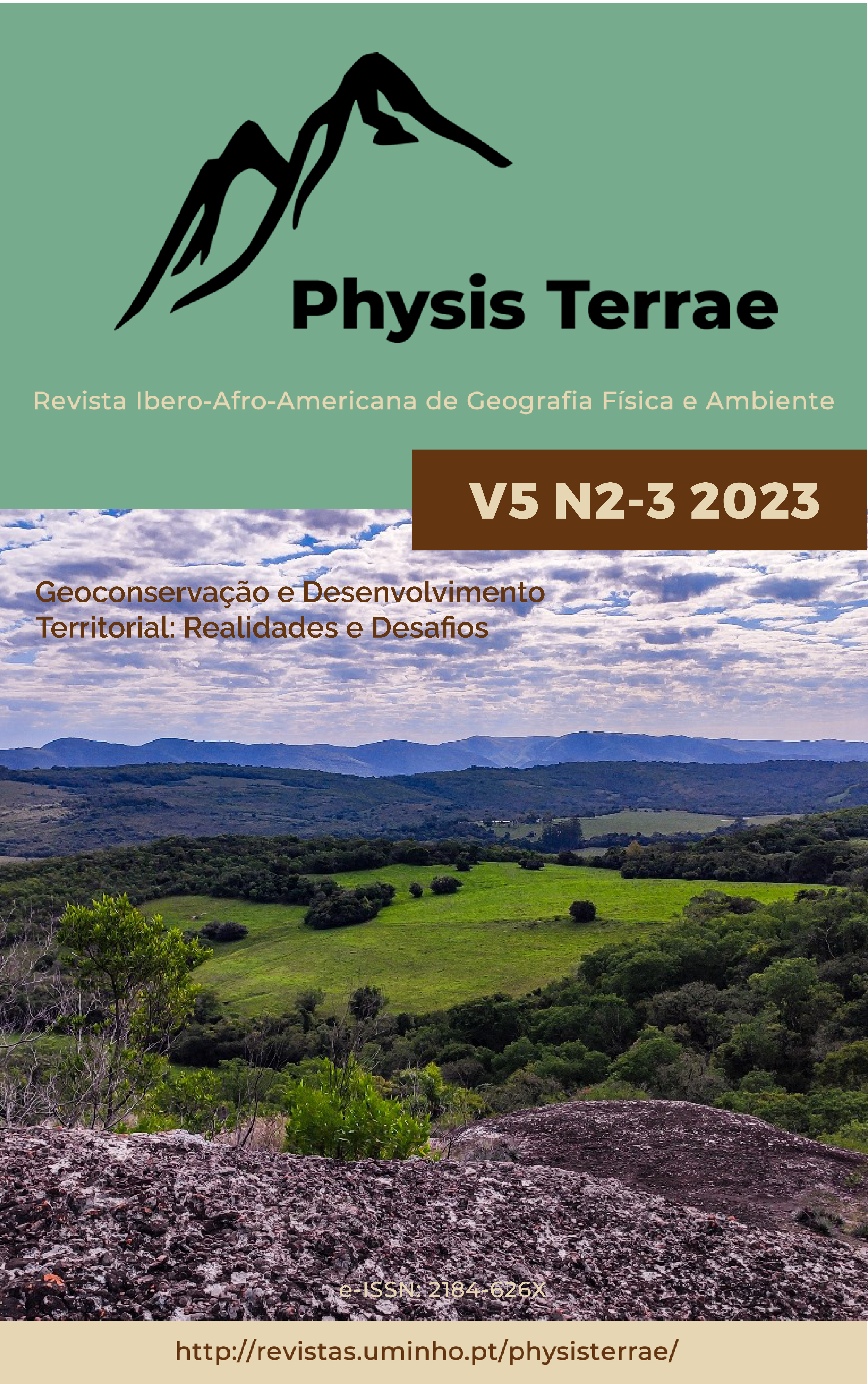Family farming and the Caçapava Geopark, a necessary relationship: from reality to a perspective of the future in Caçapava do Sul (RS, Brazil)
DOI:
https://doi.org/10.21814/physisterrae.5562Keywords:
Geotourism, Territory, Social capital, Family farming, Caçapava GeoparkAbstract
Family farming in Caçapava do Sul is not only a social category, but numerically responsible for conducting the vast majority of rural establishments in the municipality, that is, for every ten owners, six are family farmers. Therefore, it is essential to establish a dialogue between family farming and the Caçapava Geopark, as the social capital of this category is crucial to consolidate an endogenous territorial development project. Thus, the objective of the study was to analyze the role of family farming within the Caçapava Geopark territory through socio-productive indicators. The study was based on a quali-quantitative research, divided into two stages. The first part of the analysis used information from the Brazilian Institute of Geography and Statistics (IBGE). The second moment consisted of a broad theoretical review that contributed to the interpretation of the reality of the territory. Family agriculture in the municipality has unfavorable indicators in terms of technical assistance, rural extension and access to the National Program for Strengthening Family Agriculture (PRONAF). With this, it is possible to visualize a negative scenario, but also the possibility of improvement with the introduction of a new value chain associated with geotourism.
Downloads
References
Borba, A. W. (2017). Um geopark na região de Caçapava do Sul: uma discussão sobre viabilidade e abrangência territorial. Geographia Meridionalis, 3(1), 104-133. https://doi.org/10.15210/gm.v3i1.10302
Borba, A. W., Figueiró, A. S., Garcia, T. S., Domingos, S. A., & Souza, L. P. M. (2013). Peculiaridades da ‘metade sul’ gaúcha e suas implicações para a geoconservação, o geoturismo e os geoparques. Geonomos, 21(2), 79-83. https://doi.org/10.18285/geonomos.v21i2.274
Brodhag, C. (2000). Agriculture durable, terroirs et pratiques alimentaires. Le Courrier de l'environnement de l'INRA, 40, 33-45. Disponível em: https://hal.science/hal-01203246
DATA SEBRAE. (2022). Caçapava do Sul - perfil das cidades gaúcha. Disponível em 29/07/2022 em: https://datasebrae.com.br/municipios/rs/Perfil_Cidades_Gauchas-Cacapava_do_Sul.pdf
GAUCHA ZH. (2021). Avanço do cultivo da soja no Rio Grande do Sul. Disponível em 18/01/2021 em: https://gauchazh.clicrbs.com.br/ambiente/noticia/2020/12/vegetacao-nativa-do-pampa-e-a-menor-da-historia-ckirwnps80009019w08hxh1nr.html
IBGE - Instituto Brasileiro de Geografia e Estatística (2006). Sistema IBGE de Recuperação Automática (SIDRA). Informações Censo Agropecuário 2006. Disponível em 20/10/2022 em: https://sidra.ibge.gov.br/pesquisa/censo-agropecuario/censo-agropecuario-2017/resultados-definitivos#agroindustria-rural
IBGE - Instituto Brasileiro de Geografia e Estatística (2017). Sistema IBGE de Recuperação Automática (SIDRA). Informações Censo Agropecuário 2017. Disponível em 20/10/2022 em: https://sidra.ibge.gov.br/pesquisa/censo-agropecuario/censo-agropecuario-2017/resultados-definitivos#agroindustria-rural
IBGE - Instituto Brasileiro de Geografia e Estatística (2020). Sistema IBGE de Recuperação Automática (SIDRA). Tabela 1612 - Produção Agrícola Municipal – avanço da soja nos últimos dez anos no município de Caçapava do Sul. Disponível em 29/07/2022 em: https://sidra.ibge.gov.br/tabela/1612#resultado
Jorge, M. C. O. (2018). O papel das comunidades locais, sua importância e os novos desafios acerca da sustentabilidade ambiental. In Guerra, A. J. T. & Jorge, M.; C.; O. (Org.). Geoturismo, geodiversidade e geoconservação: abordagens geográficas e geológicas. Oficina de textos. São Paulo.
Krucken, L. (2009). Design e território. Valorização de identidades e produtos locais. São Paulo: Studio Nobel.
Litre, G. (2010). Os gaúchos e a globalização. Vulnerabilidade e adaptação da pecuária familiar no Pampa do Uruguai, Argentina e Brasil. Tese em doutorado em desenvolvimento sustentável. Área de concentração políticas públicas. Universidade de Brasília – UnB. Centro de Desenvolvimento Sustentável – CDS. Brasília.
Martins, R. C., & Madureira, G. A. (2019). Do “buraco” ao atrativo túristico: uma sociologia da ressignificação rural. Revista de Economia e Sociologia Rural, 57(2), 326-338,. https://doi.org/10.1590/1806-9479.2019.185693
Moreira, J. C., & VALE, T. F. (2018). Geoparks: educação, conservação e sustentabilidade. In Guerra, A. J. T. & Jorge, M.; C.; O. (Org.). Geoturismo, geodiversidade e geoconservação: abordagens geográficas e geológicas. Oficina de textos. São Paulo.
Moura-Fé, M. (2015). Geoturismo: uma proposta de turismo sustentável e conservacionista para a região nordeste do brasil. Soc. & Nat., Uberlândia, 27(1), 53-66. http://dx.doi.org/10.1590/1982-451320150104
Ortega, A. C. (2008). Territórios Deprimidos: Desafios para as Políticas de Desenvolvimento Rural. Campinas, SP: Alínea; Uberlândia, MG: EDUFU.
Pásková, M., & Zelenka, J. (2018). Sustainability Management of Unesco Global Geoparks. Sustainable Geoscience and Geotourism, 2, 44-64.
Pérez-Calderón, E., Prieto-Ballester, J.M., & Miguel-Barrado, V. (2022). Perceived Rural Development in UNESCO Global Geoparks in Spain. Land, 11(7), 1086. https://doi.org/10.3390/land11071086
Rio Grande do Sul (2015). Lei n° 14.708, de julho de 2015. Declara o Município de Caçapava do Sul “Capital Gaúcha da Geodiversidade”. Disponível em 11/04/2021 em: http://www.al.rs.gov.br/filerepository/replegis/arquivos/lei%2014.708.pdf
Rio Grande do Sul (2023). Programa Estadual de Agroindústrias Familiares. Disponível em 11/03/2023 em: https://www.agricultura.rs.gov.br/agroindustria-familiar
Rodrigues, J., Carvalho, C. N., Ramos, M., Ramos, R., Vinagre, A., & Vinagre, H. (2021). Geoproducts – Innovative development strategies in UNESCO Geoparks: Concept, implementation methodology, and case studies from Naturtejo Global Geopark, Portugal. International Journal of Geoheritage and Parks, 9, 108-128. https://doi.org/10.1016/j.ijgeop.2020.12.003
Zimmermann, S. A., Kato, K. Y. M., & Grisa, C. A(s) ruralidade(s) nas políticas públicas brasileiras: limites e possibilidades para o rural contemporâneo. In Guimarães, G. M., Balem, T., Silveira, P., & Zimmermann, S. A. (Org.), O rural contemporâneo em debate: temas emergentes e novas institucionalidades (pp. 213-234). Ijuí: Unijuí.
Downloads
Published
How to Cite
Issue
Section
License
Copyright (c) 2023 Thiago Rodrigues de Freitas, Adriano Severo Figueiró

This work is licensed under a Creative Commons Attribution 4.0 International License.


